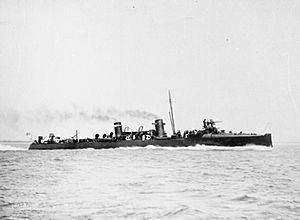HMS Ardent (1894) facts for kids

Ardent
|
|
Quick facts for kids History |
|
|---|---|
| Name | Ardent |
| Builder | Thornycroft, Chiswick |
| Laid down | December 1893 |
| Launched | 16 October 1894 |
| Commissioned | 30 April 1895 |
| Motto | Death rather than disgrace |
| Fate | Sold for breaking, 10 October 1911 |
| General characteristics | |
| Class and type | Thornycroft 27 knot - 2 funnel destroyer |
| Displacement | 265 tons (1901) |
| Length | 201 ft 8 in (61.47 m) |
| Beam | 19 ft (5.8 m) |
| Draught | 7 ft 3 in (2.21 m) |
| Installed power | 4,300 ihp (forced draught) |
| Propulsion |
|
| Speed | 27 knots (50 km/h; 31 mph) |
| Endurance |
|
| Complement | 53 officers and men |
| Armament |
|
HMS Ardent was a special type of fast warship called a torpedo boat destroyer. The Royal Navy ordered her from a company called John I Thornycroft & Company in 1893. She was the sixth ship in the Royal Navy to be named Ardent.
Contents
The British Admiralty (the group in charge of the Royal Navy) decided to order three new torpedo boat destroyers in 1893. These ships were Ardent, Boxer, and Bruizer. They were built by Thornycroft in Chiswick, England.
Designing a Fast Warship
The Admiralty didn't give shipbuilders a super strict design. Instead, they set some main goals. The new destroyers needed to be very fast, reaching a speed of 27 knots (31 mph; 50 km/h). They also needed a special "turtleback" forecastle (the front part of the ship).
Armament for Ardent
The ships had different weapons depending on their mission. If used as a torpedo boat, Ardent carried:
- One 12-pounder gun (about 3 inches wide) on a platform. This platform also served as the ship's bridge.
- Three smaller 6-pounder guns.
- Two 18-inch (450 mm) torpedo tubes.
If the ship was used more like a gunboat, one torpedo tube could be removed to make space for two more 6-pounder guns.
Ardent's Size and Power
Thornycroft's design for Ardent made her 201 feet 8 inches (61.47 m) long. She was 19 feet (5.79 m) wide and had a draught (how deep the ship sits in the water) of 7 feet 3+1⁄4 inches (2.22 m).
To make her go fast, Ardent had two powerful triple-expansion steam engines. These engines were fed by three Thornycroft water-tube boilers. The boilers used coal to create steam, which powered the engines. The ship had two funnels to let out the smoke.
Building and Testing Ardent
Ardent started being built in December 1893. She was officially launched into the water on 16 October 1894. This ceremony was done by Mrs. C.T. Cornish, whose father founded the Thornycroft company.
During her tests in November 1894, Ardent showed off her speed. She reached an amazing average speed of over 29 knots! This proved she was a very fast and powerful warship. Ardent was fully finished and ready for service by 25 March 1895.
Ardent's Time in Service
Ardent officially joined the Royal Navy on 30 April 1895. She was based at Portsmouth and then sailed to the Mediterranean Station in Malta.
Life in the Mediterranean
In Malta, Ardent became a tender to the fleet's main ship, the battleship Ramillies. This meant Ardent helped the larger ship with various tasks. One important job for Ardent was training stokers (the crew members who managed the ship's boilers). They learned how to handle the special water-tube boilers.
In 1901, Ardent was still at Malta. In 1902, she took part in important training exercises with the Mediterranean Fleet. These included practicing tactics and gunnery. Later that year, she joined other ships visiting the Aegean Sea for more training near Nauplia and Souda Bay in Crete.
An Unfortunate Accident
In April 1906, an accident happened during night exercises off Malta. Ardent was involved in a collision with a smaller torpedo boat called TB 84. Sadly, TB 84 sank, and one of her crew members died in the accident.
End of Service
After many years of service, Ardent returned to home waters in early 1911. She was then put into reserve, meaning she was no longer actively used. In July 1911, she was listed for sale. Finally, on 10 October 1911, Ardent was sold to be taken apart for scrap.

